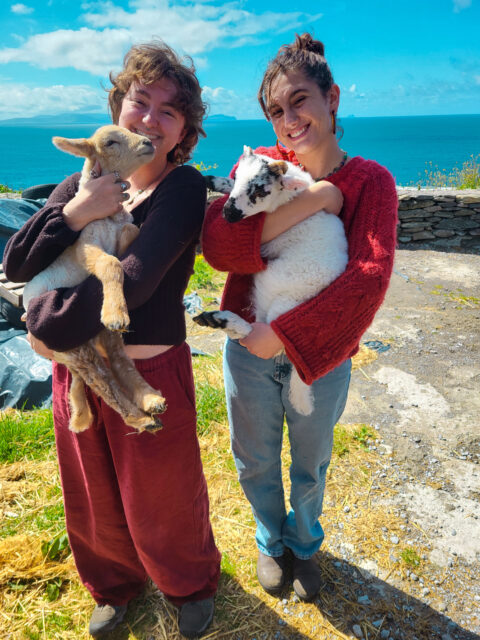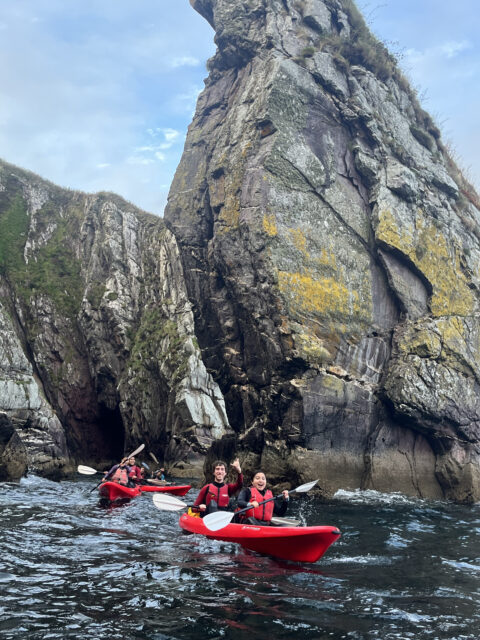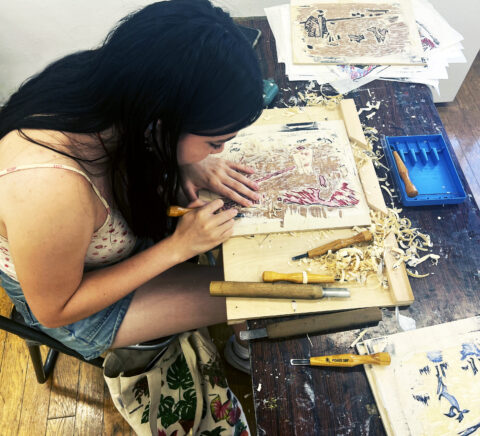Above (left to right): Anna Grossi (John R. Lewis ’25, anthropology), Arely Cano (Merrill ’25, legal studies and politics), and Cora Ethier (Kresge ’25, psychology) on the Great Blasket Island, the most westerly point in Europe. (Photo by Seán Pól Conchúir of Dingle Global Education)

Left to right: Lacie Tupper (Stevenson ’25, feminist studies) and Naomi Delaplane-Yusem (Kresge ’25, global and community health) cuddling baby lambs. (Photo by Seán Pól Conchúir of Dingle Global Education)
It can be tricky to fit every experience into a limited college timeline. Coursework, after-school jobs, volunteering, and a healthy social life can fill up a student’s schedule, and potentially cause some students to neglect taking part in a study-abroad program.
At UC Santa Cruz, Global Learning offers another option for students who have a desire to enrich their academic studies abroad but not much available time: Global Seminars.
Global Seminars are UCSC faculty-led summer courses taught worldwide, with 11 courses taught across 14 countries in 2023. Each program takes place over three to five weeks, and includes excursions and cultural activities—from museum visits to campus tours to safaris—that leverage the international location to meet the course-learning outcomes.
Classes are taught in English regardless of location, and each program generally enrolls from 12 to 25 students. In addition, courses are open to students across all 10 University of California campuses and to non-UC students.
Exploring the world
Recent graduate Nick Uglow (Kresge ’23, art) knew he wanted to study abroad, but after transferring to UCSC in 2021, wasn’t sure how long he could commit to a program. However, he always knew that he wanted to return to Japan, where he had previously done a three-month artist residency and a six-month homestay.

On the last day of the Mokuhanga workshop, 13 students are happy to receive gifts (Nuno Japanese textiles) created by students from the host university, Kyoto University of the Arts. Clockwise from top left: Emily Claridge (Stevenson ’23, art), Matthew Kim (Rachel Carson ’23, art), Nick Uglow (Kresge ’23, art), Ariel Barish (John R. Lewis ’24, art), Brennan Elliott (Stevenson ’24, art), UCLA student Kathryn LaCava, Isabella Tuell (Porter ’23, anthropology), Chris Hein (College Nine ’25, computer science), Natalia Grey (Merrill ’23, art), Keiko Utsumi (College Nine ’25, critical race and ethnic studies), Charlie Lysikhina (Oakes ’25, art), Delaney Stewart (Kresge ’23, art), and Franny Trinidad (Stevenson ’25, film and digital media) (Photo by Jimin Lee)
So it felt like fate to find the four-week Global Seminar Mokuhanga Printmaking in Japan for his final undergraduate course.
“This trip felt tailor-made for me,” he joked.
Throughout the trip, Uglow said that he bonded with many of his fellow students, both through the coursework and the travels.
Sophomore Chrissy Collins (John R. Lewis ’26) took part in a course unrelated to her disciplinary track—psychology and education—but one that aligned with her father’s inspiring travels.
“My dad traveled a lot before [I was born], but we didn’t have a lot of money to travel,” she said. “I grew up listening to his stories, so I was hoping to do the same when I was older.”
To get started, she took backpacking trips through UCSC Recreation. Those excursions helped Collins find the drive to take a trip abroad.

Kayaking sea caves in Dingle Harbor. Kayakers in the front kayak, left to right: Eli Pifer (Cowell ’26, computer engineering) and Consuelo Mendoza (Cowell ’25, chemistry). (Photo by Noel O’Leary from Irish Adventures)
![]()
![]() For the 2023 summer quarter, Collins joined 24 other students for five weeks in Dingle, Ireland, as part of the Travel Writing and Podcasting seminar taught by Writing Program Continuing Lecturer Steve Coulter (Porter ’84, literature; M.A. ’09, education) and Community Studies Lecturer Rachel Anne Goodman (Rachel Carson ’84, environmental studies). While it was Collins’s first trip to Ireland, it felt like a home away from home, as she had grown up in an Irish-Catholic community in San Francisco.
For the 2023 summer quarter, Collins joined 24 other students for five weeks in Dingle, Ireland, as part of the Travel Writing and Podcasting seminar taught by Writing Program Continuing Lecturer Steve Coulter (Porter ’84, literature; M.A. ’09, education) and Community Studies Lecturer Rachel Anne Goodman (Rachel Carson ’84, environmental studies). While it was Collins’s first trip to Ireland, it felt like a home away from home, as she had grown up in an Irish-Catholic community in San Francisco.
“It felt like a big field trip,” she said, laughing, noting that she bonded with a few students for a full week in Dublin prior to the course.
Collins also enjoyed that the coursework was integrated into its surrounding Irish milieu, including interviewing local community members for the podcasting course and learning about cultural differences by doing routine things like exploring the grocery store’s ice cream aisle.
“It was less like schoolwork, and more about being interested in the place where we lived,” she said. “[The experience] gave me more confidence and independence.… [It] helped to push me out of my comfort zone and show me that I can do more with my life and my education.”
Returning home
As much fun as the Global Seminars can be for students, they’re also a welcome opportunity for the professors. Many have previously lived or studied in the Global Seminar destinations, and the chance to return—even for just a few weeks—is a chance to share their knowledge and love of the areas with their students.

Students at the Awagami Factory in Tokushima, attaching their own handmade washi (Japanese traditional paper) on wooden panels for drying (photo by Jimin Lee)
Coulter, who led the seminar in Dingle, previously lived in Europe for 20 years,10 of which were in Dingle working as a musician and recording engineer. As such, it only made sense to welcome students to the place he had considered home.
“I forged many close friendships and professional connections in that small town.… I could introduce my students to the culture that I was deeply a part of,” he said.
Professor of Art Jimin Lee led the seminar in Japan this August, taking 13 students across the country to learn more about the classic Mokuhanga woodblock printmaking technique from artists firsthand. This was Lee’s fourth time leading a Global Seminar, taking students to the areas she previously frequented as an artist, including where she has showcased her own artwork in the Shirota Gallery. Lee has also developed relationships with many other artists and art organizations ever since she completed her studies at Tokyo University of the Arts decades ago.
Even after four years, Lee is grateful and excited to lead the program.

Ariel Barish carving one of her woodblocks. (Photo by Jimin Lee)
“For many of them, it was their first-ever international trip, and it was a really good group,” she said. “For the students, it was an interesting opportunity to learn from one another and the experts in Japan.”
The trip wasn’t without a few challenges, of course, with extremely hot temperatures and long, arduous schedules to fit everything in. Yet, the students’ motivation and commitment to the course made the experience that much deeper for Lee and the group at large.
For some, the program was even the push for their next steps postgraduation. Uglow will attend Tokyo University of the Arts beginning in 2024, to receive his master’s degree in printmaking—a trajectory he attributes to Lee.
“I’ve known I wanted to live in Japan for a long time, but knowing where or how that would happen has always been an unknown,” he said. “The trip definitely helped cement what I wanted to do going forward.”
Each year, about 70% of undergraduate students rely on financial aid to help fund their study-abroad/away experience. You can help us remove financial barriers for students who otherwise could not afford to study abroad.
Every donation goes directly toward providing students with an international experience, where they explore and engage with other cultures. Give today.

